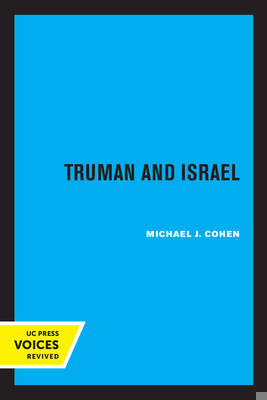
- Retrait gratuit dans votre magasin Club
- 7.000.000 titres dans notre catalogue
- Payer en toute sécurité
- Toujours un magasin près de chez vous
- Retrait gratuit dans votre magasin Club
- 7.000.0000 titres dans notre catalogue
- Payer en toute sécurité
- Toujours un magasin près de chez vous
Description
Michael J. Cohen's Truman and Israel offers a penetrating examination of one of the twentieth century's pivotal moments: the American president's role in the founding of the State of Israel. Between 1947 and 1948, Harry S. Truman's decisions carried extraordinary weight in shaping Israel's diplomatic future. While historians have long acknowledged his influence, they remain divided over his motivations. Was Truman inspired by biblical sentiment and a sense of destiny, by liberal ideals of democracy in a volatile region, or by the pressures of domestic politics? Cohen's study tackles these questions head-on, grounding the analysis in Truman's formative years in the American Midwest and tracing the personal values, prejudices, and loyalties that shaped his worldview. By beginning with Truman's modest upbringing and hard-won ascent into political life, the book situates foreign policy decisions in the context of a deeply personal moral and social framework. The narrative foregrounds the intimate relationships that played a decisive role in Truman's Palestine policy. Figures such as Eddie Jacobson, Abe Granoff, Max Lowenthal, and David Niles emerge as key intermediaries who brought the Zionist cause directly into the White House, counterbalancing the pro-Arab inclinations of the State Department. Cohen makes extensive use of private letters, diaries, and interviews--including Lowenthal's previously unpublished records--to provide an unprecedented view of the political maneuvering, backroom discussions, and personal appeals that influenced Truman's thinking. At the same time, the book recreates the broader atmosphere of official Washington in the late 1940s, populated by colorful and contentious personalities from James Forrestal to Loy Henderson. By concluding with the resolution of the first Arab-Israeli war and the reluctant consensus that Israel represented a strategic Western asset, Cohen captures the convergence of moral conviction, personal loyalty, and realpolitik that defined Truman's stance. Truman and Israel thus illuminates the complex interplay between individual character and global diplomacy at a critical historical juncture. This title is part of UC Press's Voices Revived program, which commemorates University of California Press's mission to seek out and cultivate the brightest minds and give them voice, reach, and impact. Drawing on a backlist dating to 1893, Voices Revived makes high-quality, peer-reviewed scholarship accessible once again using print-on-demand technology. This title was originally published in 1990.
Spécifications
Parties prenantes
- Auteur(s) :
- Editeur:
Contenu
- Nombre de pages :
- 356
- Langue:
- Anglais
Caractéristiques
- EAN:
- 9780520332881
- Date de parution :
- 15-07-22
- Format:
- Livre broché
- Format numérique:
- Trade paperback (VS)
- Dimensions :
- 156 mm x 234 mm
- Poids :
- 562 g

Les avis
Nous publions uniquement les avis qui respectent les conditions requises. Consultez nos conditions pour les avis.






